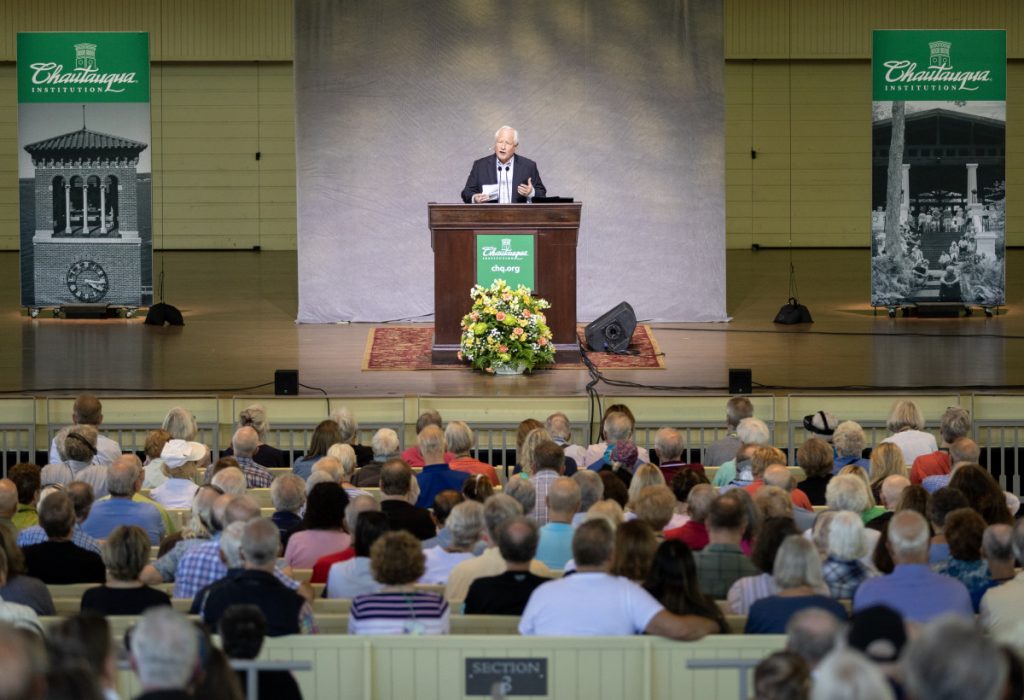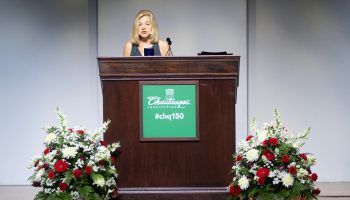
Alton Northup
Staff writer
While the United States’ political center has not crumbled yet, Bill Kristol warns we cannot ignore the cracks.
Kristol, whose long list of credentials includes former chief of staff to Vice President Dan Quayle, founder of The Weekly Standard, and editor-at-large of The Bulwark, opened the Chautauqua Lecture Series Week Three theme, “Can the Center Hold? – A Question for Our Moment,” at 10:45 a.m. Monday in the Amphitheater.
The erosion of the United States’ political center is the result of many factors, Kristol said, including fading communities and population spread. However, he considers President Donald Trump to be the driving force behind polarization in the country.
“The assumption has always been that even if you run a somewhat polarizing – I would say demagogic – campaign … the campaign ends and you overcome that rhetoric,” he said. “…Honestly, President Trump didn’t try to even overcome it as president. He doubled down on it.”
Kristol, who left the Republican Party after Trump’s nomination for the presidency in 2016, said the former president’s approach to politics has since trickled down to candidates at every level of government.
Polite discourse on policy has given way to personal attacks and fear mongering on the debate stage, and even in our communities, he said.
“When the whole country becomes gripped by the kind of affective polarization where you believe the worst about your opponents, you call them enemies, not opponents,” Kristol said. “You think of them as enemies; you think of them as more dangerous to the country than actual enemies who are brutally invading other countries abroad – that’s a very hard situation to maintain a kind of healthy civic life, or healthy politics.”
Past presidents, Kristol said, understood that their role as head of state meant they represented the whole of the nation – not 51% of it. He said that Trump’s critics felt vindicated following the Jan. 6 attack on the Capitol, and hoped the rest of the Republican Party would finally agree he had become too radical.
Now, with Trump as the frontrunner for the party’s 2024 nomination, Kristol said the country is no less polarized now than it was in the last few weeks of his presidency. Still, there is hope for the center. But Americans need to decide if they want it.
“We want a society with vigorous debate. … We shouldn’t overly romanticize centrism,” he said.
People often reflect on a bygone era of bipartisanship where members of Congress would sit down for a drink and work on policy together, he said. It is not as nostalgic, Kristol argued, when you consider the policies they wrote were often exclusory and not made to benefit most Americans.
Instead, the focus should be on shared ground rules for debate. The true center, he said, is healthy disagreement. It is by the Founding Fathers’ design that “the American political system anticipates conflict.”
“Just to operate decently as a polity, as a political system, as a society – one needs a functioning center,” Kristol said.
He drew on the poem “The Second Coming,” written by William Butler Yeats in the fallout of World War I, from which the week’s theme takes its name: “ ‘Things fall apart; the center cannot hold; mere anarchy is loosed upon the world. … The best lack all conviction, while the worst are full of passionate intensity.’ ”
For many in Europe, the poem was a premonition of an approaching second world war. It was a time, Krisol said, when the center had truly collapsed, and Yeats understood the implications of that.
“… And what rough beast, its hour come round at last, slouches towards Bethlehem to be born?” the poem concludes.
Anarchy, Kristol said, always leads to something worse. In this case, it brought the rise of fascism and a previously unknown destruction to Europe. But still, the center prevailed, and functioning liberal democracies now govern much of the continent.
“It’s a good reminder that the center may not hold, … but we are eager to reconstruct,” he said.
Kristol said if Americans want to prevent the center from falling, they need to be vigilant.
He often encourages young people, and especially military veterans, to get involved in politics. He said he hopes the post-Sept. 11 generation can replicate the Greatest Generation, who he credits for holding the center together after World War II.
In 2019, he founded Democracy Defending Together – an advocacy organization responsible for projects such as Republican Voters Against Trump and Republicans for the Rule of Law.
“This is a very important moment for the future of our country and, I would say, for the world,” Kristol said. “We can’t just assume the system’s going to work it all out.”




